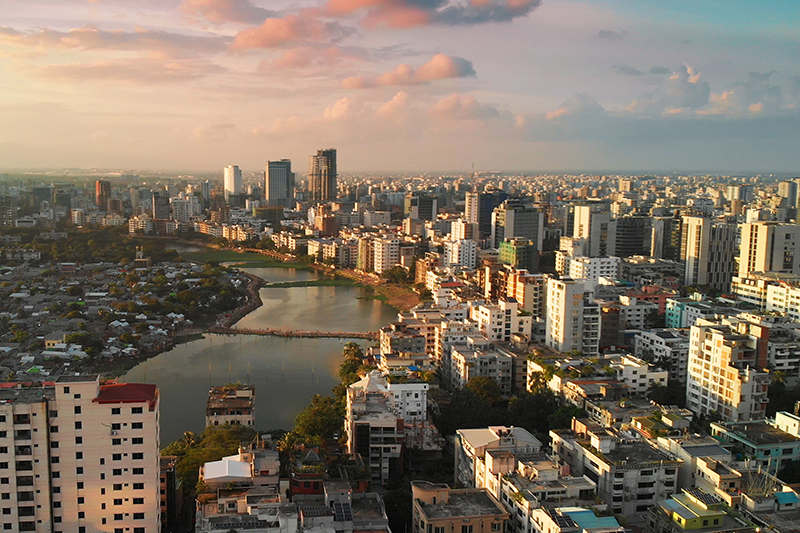Pollution Reduction as Smart Business

WRG working to provide wastewater services to 20 million Bangladeshis with $450M in PPP financing for pollution reduction.
Bangladesh’s rapid growth and urbanization have intensified pressure on its water resources. Untreated wastewater leads to environmental degradation, public health risks, and economic costs estimated at nearly $3 billion annually. Without intervention, financial losses from river pollution could reach $51 billion over the next two decades. These conditions impact millions, with three-quarters of the population lacking safely managed sanitation services and over 40 percent of improved drinking water sources contaminated with E. coli.
The Bangladesh Delta Plan 2100 provides a comprehensive strategy to manage and reduce pollution, protecting the nation’s vital water resources and public health. Key components include developing centralized wastewater treatment infrastructure, such as central effluent treatment plants (CETPs) and sewage treatment facilities, to address both municipal and industrial wastewater.
Addressing Financing Challenges for CETPs
Financing CETPs presents significant challenges due to their high initial capital costs and long return on investment periods. In Bangladesh, attracting private sector participation is particularly difficult because CETPs often involve complex regulatory requirements and substantial risks, including fluctuating industrial water quality and maintenance uncertainties. Additionally, the fragmented nature of wastewater sources and the need for coordinated efforts among multiple stakeholders can hinder streamlined financing. Without robust financing mechanisms and strong policy support, securing the necessary funds to build and sustain CETPs remains a major obstacle to effective wastewater management and pollution reduction.
Setting Ambitious Targets for Scale
The 2030 Water Resources Group (WRG) is addressing these challenges by supporting the Government of Bangladesh, local authorities, and the private sector to develop public-private partnerships (PPPs) that enhance wastewater management. By leveraging private sector expertise and financing, PPPs enable the expansion of services, reduction of pollution at scale, and alleviation of public budget pressures.
WRG’s engagements aim to mobilize $450 million in public finance and $100 million in private finance, promoting shared responsibility and reducing dependency on public funds alone. Once complete, the developed CETPs and sewage treatment facilities will provide wastewater services to at least 3.5 million people. This effort is part of a broader goal to benefit around 20 million people, directly and indirectly, with improved wastewater services. Over 25 million cubic meters of wastewater will be treated, significantly reducing pollution loads in key urban and industrial areas.
By leveraging public-private partnerships, the government is transforming how wastewater is managed in Bangladesh. These efforts not only address critical environmental and public health challenges but also demonstrate the potential for scalable solutions that align sustainability with economic growth.
Key Initiatives
Advancing Municipal Wastewater Management:
Gazipur, Bangladesh’s largest city corporation on Dhaka’s outskirts, currently lacks centralized wastewater infrastructure. A PPP project conceptualized by WRG and modeled by the International Finance Corporation (IFC) aims to serve 2.5 million people with two treatment plants handling 70 million and 120 million liters per day. A pilot plant treating 20,000 liters per day is already operational, building familiarity before full-scale implementation.
Extending PPPs to Industrial Economic Zones:
Industrial activities, particularly in textiles, generate significant amounts of untreated wastewater. In Dhaka alone, about 5,000 water-intensive industries produce 2.3 million cubic meters of wastewater daily, harming water quality and contributing to greenhouse gas emissions. At the request of the Bangladesh Economic Zones Authority (BEZA), WRG supported preparatory work for CETPs and solid waste systems in Jamalpur and Srihatta. These projects build on the Mir-Sarai CETP model, blending public and private finance through a PPP structure, supported by a memorandum of understanding with the Embassy of the Kingdom of the Netherlands.
Shaping Policy and Market Incentives:
Beyond infrastructure, supportive policies are crucial for making wastewater treatment and reuse viable investments. In collaboration with the Water Resources Planning Organization (WARPO), WRG helped develop the Industrial Water Use Policy. A national workshop in May 2024 incorporated perspectives from government, private sector, and academics, refining the policy for anticipated approval in 2025. Additionally, WRG developed a National Framework for Water Resilient Production Practice and guidelines for voluntary water allocation, providing real-time data and recommendations for efficient water use.
Catalyzing Green Finance:
To spur investment in sustainable water management, WRG collaborated with Bangladesh Bank on a national green financing framework. This framework assists factories—both those struggling with efficiency and those already performing well—in accessing green bonds and related instruments. By lowering the cost of capital for water-saving technologies, these measures encourage pollution reduction as part of long-term business strategies.
A Structured, Multi-Stakeholder Process for Water Reuse
The Bangladesh Delta Plan 2100, supported by WRG’s PPP models and innovative financing, showcases a replicable and scalable approach to pollution reduction. Aligning sustainable water practices with market-based solutions, Bangladesh is leading the way in making water reuse a core strategy for tackling water scarcity and pollution. As these projects advance, the lessons learned in Bangladesh can inform similar efforts nationwide and globally.
